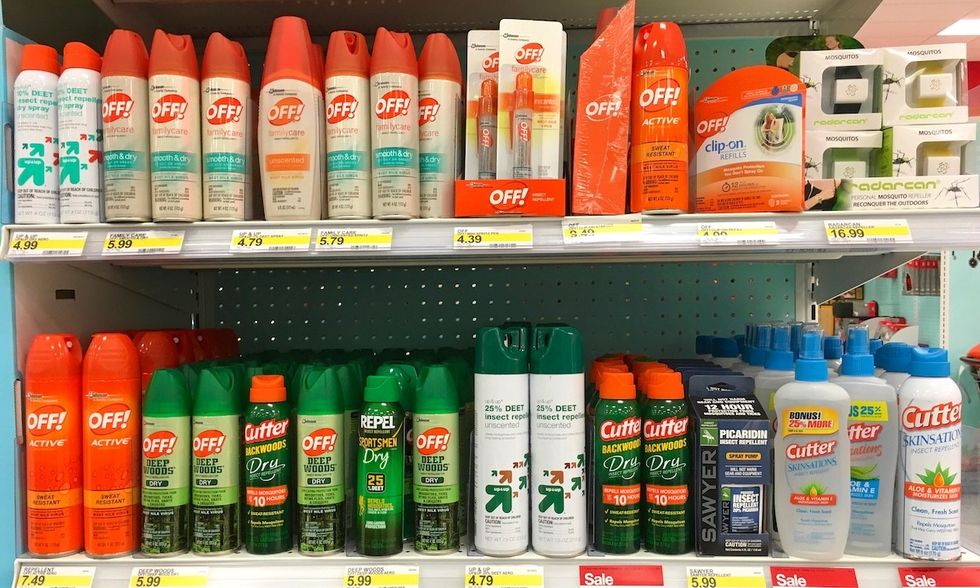For over 80 years now, people have used DEET as an effective insect repellent. Besides offering a reprieve from pesky bug bites, it also helps prevent the subsequent spread of dangerous insect-borne illnesses, including Zika virus, Dengue, and West Nile virus from mosquitoes, and Lyme disease and Rocky Mountain Spotted Fever (RMSF) from ticks. This summer, authorities highlighted two more serious insect-borne illnesses that have been spreading by bug bite: Oropouche Virus and eastern equine encephalitis (EEE). Both are rare but potentially deadly in their most severe cases. Given the rise of these illnesses, many people are wondering how to best protect themselves from bug bites—and asking themselves: Is DEET is bad for you?
RELATED: 21 Americans Infected With Mosquito-Borne “Sloth Fever”—5 Symptoms to Know.
Oropouche (also known as “sloth fever”), which primarily spreads through the bites of biting midges and sometimes through mosquito bites, yields symptoms similar to Dengue, Zika, or Malaria: fever, chills, headaches, joint pain, nausea, stomach upset, and skin rash. Meanwhile, EEE (nicknamed “triple E”), which has recently surfaced throughout the northeastern U.S., can similarly produce fever, chills, body aches, and joint pain, or in more serious cases, swelling in the brain and central nervous system.
Therefore, Thomas Pontinen, MD, LCP-C, a physician and the co-founder Midwest Anesthesia and Pain Specialists (MAPS), tells Best Life that it’s important to protect yourself against insect-borne illnesses. Since he has traveled extensively as a volunteer for Doctors Without Borders (MSF), he knows these dangers very well.
“Mosquitoes are notorious vectors of several potentially deadly diseases, including the West Nile virus, the Zika virus, malaria, dengue, and yellow fever. These diseases are more common in developing countries in the tropics, but outbreaks in the temperate zones are frequent enough to make mosquito bites a genuine concern,” he shares. “This explains the popularity of mosquito repellents, especially among people who are fond of outdoor activities like myself.”
“Many of these repellents contain DEET, short for N-diethyl-meta-toluamide, as their active ingredient,” he continues. “Because of its name, some people mistake it for an insecticide, which explains why they might be concerned about its toxicity,” Pontinen notes. “However, DEET is not an insecticide because it doesn’t directly kill mosquitoes. Instead, it interferes with mosquitoes’ senses, masking our presence to make it harder for the insects to locate us.”
The good news is that DEET is generally considered safe when used as directed, says Eve Elizabeth Pennie, MD, a general practitioner, epidemiologist, and medical contributor for Drugwatch.
“It is one of the most effective insect repellents available and is recommended by health organizations such as the Centers for Disease Control and Prevention (CDC) for preventing mosquito bites,” she says. “DEET has been extensively studied and has a good safety profile for adults and children.”
In fact, Pontinen points out that the U.S. Environmental Protection Agency (EPA) conducted two reviews on DEET in 1998 and 2014, and both concluded that DEET poses no significant risks to human health. Contrary to public perception that DEET might be linked with increased cancer risk, the EPA also determined that DEET cannot be classified as a carcinogen.
RELATED: 7 Reasons Mosquitoes Are Attracted to You, According to Science.
However, Pontinen notes that there are a few caveats to keep in mind before you slather yourself in the stuff. First and foremost, you should always follow the instructions for application carefully.
“DEET should strictly be applied externally, which means you’re supposed to avoid applying it on areas with wounds and bruises, as well as the mouth and eyes. To make sure you don’t do it inadvertently, make sure to always wash your hands after application,” he says.
You can also spray DEET on your clothing—for instance, on your shoes or the cuffs of your shirts or pants—to prevent direct contact with skin.
Pennie adds that while DEET is generally considered safe for most people, it is not recommended for infants under two months old, and individuals with a history of allergic reactions to DEET. “Pregnant and breastfeeding women can use DEET, but they should consult their healthcare provider for advice on the safest products and concentrations,” she adds.
RELATED: 5 Plants That Will Keep Mosquitoes Out of Your Yard, According to Pest Experts.
There are also several effective alternatives if you still don’t feel safe using DEET.
“Picaridin, for example, is a popular alternative because it is odorless and not greasy on the skin. There is no significant difference between the efficacy of picaridin and DEET, and in fact, these products are becoming equally popular as active ingredients in repellents,” says Pontinen.
Pennie also recommends IR3535, a synthetic repellent that is used in formulations for sensitive skin. Other popular alternatives include repellents made from plant sources, including citronella, lemongrass, and eucalyptus, but these are less effective compared with DEET.
“In my experience, these repellents are somewhat effective, but it can be hard to ensure the contents and efficacy of different brands, given the less strict regulatory environment around these natural products,” says Pontinen. “I think it’s best to always check reviews and investigate the ingredients for best results.”
If you plan to be outside for a while, prepare yourself with multiple deterrents. Don’t rely on one natural spray,” he advises. “If you find it’s not working for your circumstances, it’s great to have a second option to fall back on.”

